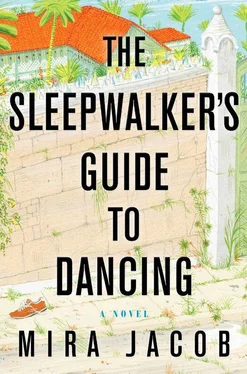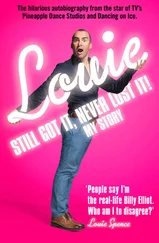“No. They. Don’t.” Dimple took pains to enunciate. “Remember when we went back and forth before you signed the contract? That was about owning the rights to your pictures. The P-I is allowed to use the picture because technically you were on assignment for them, but after that the rights revert to you. Anyone who wants the picture needs to deal with you.”
“What if I don’t want to be dealt with?”
“That’s why I’m saying I’ll do it for you .”
Surely all that was required was a yes, thank you, a quick disconnection. A roll back under the covers, back to dreams riddled with Akhil. But it was coming again, the cold grip that had arrived with the previous day’s paper, the name Bobby McCloud, the stunned grief of the people who loved him clenching over her entire body like some big fist. What could they have felt when they saw that picture? What had she made them see? Amina shivered.
“Ami, are you there?”
“They’re never going to be able to unsee it.”
“What?”
“He had kids. Did you know he had kids?”
There was a long silence on the other end of the line.
“I’m coming over,” Dimple said.
Bad idea .
“Don’t!” Amina cast a quick eye at the piles of chaos around her room, the bottles, the butts, the newspapers. “You’ll get in trouble at work.”
“Just to bring you lunch, okay? We don’t even have to talk about it if you don’t want to.”
“Dimple, I’m fine.”
“Yeah, okay. See you in ten.”
“No! Stop! Jesus, just give me a moment. I was asleep when you called. I just need to get my bearings and — it’s fine, okay? Do it. You should do it. Negotiate it with the agencies or whatever. Go for it.”
“Oh, God, I don’t fucking care about that now. I wasn’t thinking, okay? I know this is about Akhil. Just let me come.”
“It’s not …” Amina heard her voice cracking and swallowed. “Can you just please just take care of the agencies? That would really help.”
She held her breath, waiting for Dimple’s conscience to wrestle through the moment.
“Really?” her cousin asked after a few seconds.
Amina exhaled. “Yes.”
“Okay, but I’m coming right after work.”
“I’ve got plans that might go late,” Amina lied. “I’ll call you.”
After, when the phone was back in the cradle and Dimple was safely held at bay, Amina leaned off the bed, needing to put something between herself and the afternoon light slipping under the shades. And though it was not her style, really, though it reeked of women’s television dramas and asking-for-it from some damning God, though it was overblown and overdramatic and more than a little bit disgusting, she pulled the bottle off the nightstand and took a sip, gagging as it hit her gut.
Cheers, kid .
He had underestimated the power of the money. Not the $138 million — Bobby McCloud was right about that portion — which, wisely invested in the Emerald Queen Casino and the Chief Leschi Schools, really would pull the tribe out of permanent poverty. But the effects of the $20,000 settlement checks on individual members of the tribe — that he had misjudged entirely.
“Bobby used his smarts and his place in the tribe to give us away wholesale today,” his brother Joseph “Jo-Jo” McCloud told reporters on the Tacoma Sheraton steps immediately after the signing ceremony (TRIBE TRADES LAND FOR FUTURE, Seattle Post-Intelligencer , March 24, 1990). “If our parents were alive, they’d be weeping.”
From May 1990 to the beginning of 1991, the Puyallup Indians lived what one anonymous tribal member referred to as “a big eight months of the American dream.” Cashing a single check worth more money than many made in two years, they bought cars (Firebirds, Z28’s, fourth-hand BMWs, a team of pickup trucks), vacations (Disneyland, SeaWorld, Vegas), necessities (diapers, gas, food, heaters, tires, clothes), and nonnecessities (family portraits, dinners out, drugs).
By June 1991, a year and a half after the checks were cut, an estimated 75 percent of those who had received the money had spent it all.
Well, there’s a fucking shocker .
“It’s understandable,” Amina said, folding the paper in half.
No one said it wasn’t understandable .
“Don’t believe that romantic BS about when you don’t have money, you don’t realize what you’re missing. When you’re hungry and broke, you feel plenty bad,” said tribal member Gladys Johns (ONE YEAR LATER: THE PUYALLUP TRIBE LOOKS BACK, The Seattle Times , March 23, 1991). “But when you have money and it goes? Then it feels worse.”
Vacations became a series of photographs. Houses swallowed down payments and spat out inhabitants. Cars were repossessed so regularly that coming out of a bar to find that someone had “stolen your horse” was less embarrassing than it was inconvenient.
“It was killing Bobby,” childhood friend and tribal member Sherilee Bean told The New York Times Magazine (“Buying Off the American Conscience,” October 12, 1992). “All of us, but Bobby especially. Everyone was hit so hard when the money dried up. Even those of us who spent it wisely or invested, we still had to watch our brothers and sisters crash.”
In January 1992, Uncle Ronnie McCloud was found in a Las Vegas hotel room, dead from a ten-day alcoholic binge. In March, cousin Michael John was paralyzed from the neck down in a truck crash. In May, brother Jo-Jo McCloud swallowed two bottles of aspirin. He died on May 15, 1992, after spending three days in a coma.
“Aminaminamina!” Thomas crowed into the answering machine. “Wake up, fuzz head! Shake off the day! Rise and shine! Tell us all about it! Your mother’s head is already swelling like a balloon, and we haven’t even gotten to—”
“But why can’t you be telling us anything, koche ?” Kamala sounded bitterly pleased. “Bala herself says Dimple says some picture of yours is on the front papers and everyone wants it, and now that Queen of Sheba is calling and telling Sanji and Raj and God-knows-who-else like it’s her daughter who—”
“And she said something about in The New York Times Magazine itself?” Thomas asked. “You must send a copy!”
There was a brief pause while Amina’s parents, spent, breathed silent elation into the phone line. Then they hung up, Thomas first, Kamala next, and only after reminding Amina to send the picture and also to please rub the coconut oil into her hair once a week to make it blacker.
In the late afternoon of August 26, 1992, Bobby McCloud parked in the parking lot in the back of the Still Life Café and walked up Fremont Avenue to Sally’s Party Supply. There he bought the “Cherokee Male” costume for children ages fourteen and up. Seven minutes later, having changed into the yellow plastic fringed shirt and pants in the employee bathroom, he headed out of the store.
The first check of several that would arrive throughout the year was more than Amina made in three months. It was certainly more than she would make in September and October, seeing as how she had all but stopped working. She set the check on the kitchen counter and watched as a patch of sunlight moved over it, half expecting it to turn to ash, and lighting another cigarette when it didn’t.
Blood money for blood money, huh?
“Fuck off.”
She tried to always keep a cigarette lit now. Knowing that she would burn down the apartment if she slept kept her in a dull panic, ensuring that she stay awake. Sleep was to be avoided, if possible. She had begun to have dreams, and they were obvious, and the obviousness of them infuriated her. Bobby McCloud war-painting himself with batches of tempera. Bobby McCloud reading her the entry for the Spanish-American War from the 1979 edition of the Encyclopaedia Britannica . Bobby McCloud standing in high branches of a cottonwood tree, showing her the wingspan of a full-grown man.
Читать дальше












